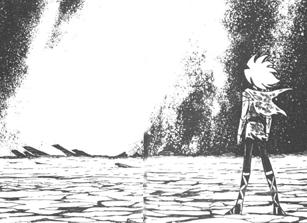
Many characters ask him, "How old are you? When were you born?" To which Locke only answers: "I don't remember." Who knows; he may be telling the truth.
Locke has been around since at least the earliest days of humanity's colonization of space (as seen through one or two flashback stories). The books follow him as he lives through the hundreds of years of humanity's spaceward expansion, through the first Galactic Federation, through the formation of the Galactic Empire, to the Empire's downfall and the rise of a new Federation of Planets. Through all this time, Locke plays a crucial role, whether as an anonymous, lonely figure, or as "THE superman Locke."
Locke, for all his power and age, would much rather sit around and be a sheep farmer somewhere (he says so himself). But, as a humanist who has never given up hope for the good side of human nature, as well as a pacifist who can't stand seeing innocent (or even not innocent) people die, he inevitably gets drawn into intrigues, battles, and wars. And each battle leaves him with new skills and new powers --- which gets ridiculous, after a while. Locke, as the series progresses, reaches almost godlike levels of ability; not only can he see through walls and read minds, use telekinesis and float in space with no ill effects, but he can teleport fractions of light years, change his appearance (even gender) at will, heal the wounded, throw energy blasts that can destroy small moons, and even destroy entire planets if desperate enough. Not that he necessarily wants to or likes doing these things. To help provide a check, newer technology introduces anti-ESPer devices, things that locate psionic emissions and even send jamming signals that hurt psionics greatly. And, of course, there are lots of other psionics out there who don't necessarily like Locke or whatever cause he's working for.
One of the frequent, recurring themes in this series is the plight of psionics in the world. As a powerful but small fraction of the population, psionics (ESPers) are reviled, loathed, feared --- or just plain viewed as useful, but dangerous, tools. Psionics view themselves with ambivalence, sometimes thinking they are the chosen future of humanity, sometimes seeing themselves as dangerous mutants, sometimes just wanting to live normal, human lives. Locke, of course, is of that last type, and hates seeing others used as tools. In one powerful scene he demands of his opponent (who thinks of herself as a tool for a dubious greater cause): "Why don't you live as a human being? ... [Or] will you live on as just a tool...?"
The Locke books come with all types of stories. One follows Locke as he returns the heir to the throne of a "lost planet" (planet which lost contact with civilization, and vice versa) to her rightful place --- with the twist that the entire planet is full of psionics, in addition to dangerous beasts. Another story follows Locke as he attempts to deal with a psionic mind-control device, which captures psionics' minds while they sleep, and forces them to do nasty things. The plot gets thicker when those who ordered the device turn out to have connections with the Galactic Imperial government.
What probably helped make Locke so successful, other than Locke's inherent charisma, is the political detail in each story. Sideplots within the main story show the reader the current state of the galaxy, and often the results of those sideplots are seen several books later, in the form of large-scale changes in the world. Unfortunately, the series suffers from what looks like schizophrenic plots --- as if two people had agreed to a basic plot outline, then independently written two different books, strung them together as a two-parter, and only after publication had compared notes to decide what plot to write next. And a rather minor but aggravating flaw is that *every single book* seems to have ONE mis-spelled English word in it somewhere ("mail" for "male," or "road" for "load," etc.)
Overall, however, the series provides and intriguing look at an interesting view of humanity's future --- and raises some good questions as well.